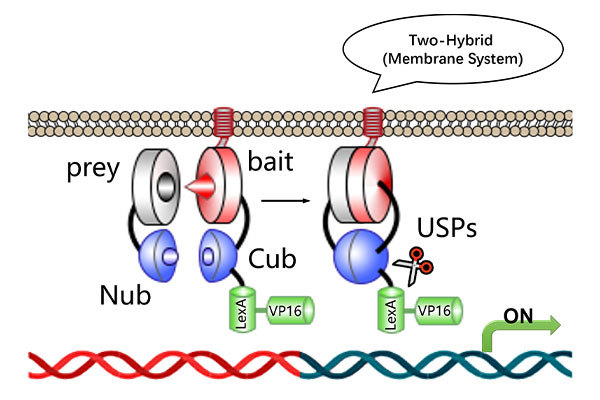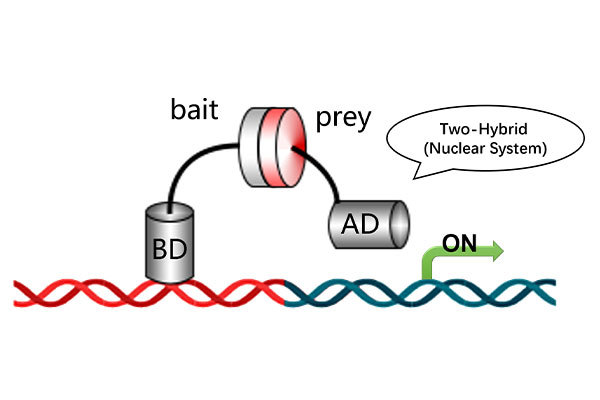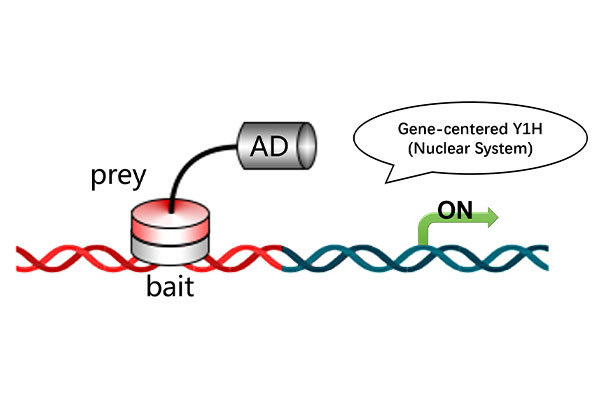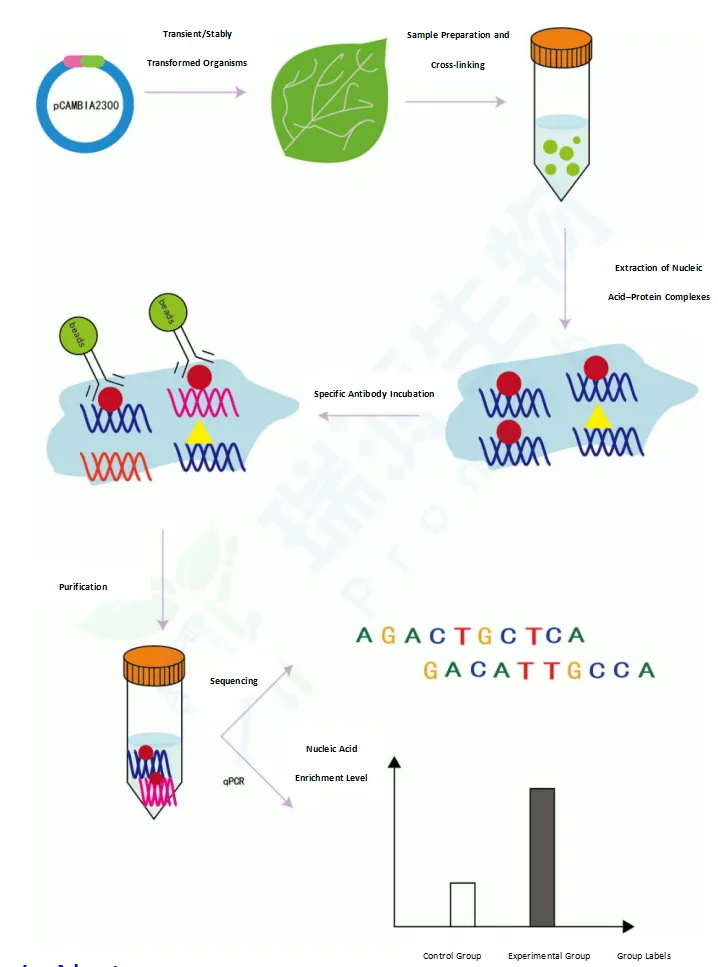Services
Providing Advanced Biological Technical Services for Researchers in Fundamental Science
Immunoprecipitation-Mass Spectrometry (IP-MS) Service
Immunoprecipitation-Mass Spectrometry (IP-MS) Service
Unlock Protein-Protein Interactions for Advanced Biological Research
Service Overview
Immunoprecipitation-Mass Spectrometry (IP-MS) is a powerful technique used for protein-protein interaction studies. By utilizing the specific binding affinity between antibodies and target proteins, this method isolates interacting proteins from complex biological samples. Combined with mass spectrometry analysis, IP-MS offers detailed identification of interacting proteins, providing insights into biological networks and cellular mechanisms.
IP-MS is highly effective for protein identification and protein interaction network exploration, facilitating the discovery of novel interactions and enabling researchers to study cellular processes in their native environment.
How IP-MS Works: Technical Principle
IP-MS involves the affinity between specific antibodies and target proteins. The process starts by incubating the sample with Protein-A/G conjugated to magnetic beads, which form a complex that includes the target protein and its interacting partners. The immune complex is then purified through immunoprecipitation, isolating the proteins from the sample.
Once isolated, the proteins are analyzed using mass spectrometry (LC-MS), which identifies the proteins and provides a detailed map of their interactions. This allows for the comprehensive study of protein-protein interactions, enabling you to uncover biological pathways and regulatory networks in living cells.
Key Advantages of IP-MS
Discover Novel Protein Interactions:
IP-MS is not only used to validate known protein interactions but also to discover previously unknown proteins that interact with the target protein. This enables the identification of new biological pathways and novel biomarkers.
Physiologically Relevant Data:
Unlike in-vitro methods, IP-MS provides in-vivo data, capturing protein interactions under conditions that more closely resemble the physiological state of cells.
Comprehensive Validation Methods:
Multiple protein interaction validation techniques are available, including Co-IP, pull-down assays, and digital protein interaction site mapping, offering comprehensive confirmation of interaction results.
High Sensitivity and Accuracy:
IP-MS is highly sensitive and can identify low-abundance proteins involved in protein interactions that might otherwise be missed by traditional methods.
IP-MS Service Workflow
Sample Preparation:
Collect CDS (Coding DNA Sequence) information of the target protein.
Gene Synthesis/Vector Construction:
Gene synthesis and vector construction are confirmed with sequencing to ensure accurate representation of the target protein.
Agrobacterium Transformation:
Agrobacterium is used for tobacco transient expression, allowing for the efficient expression of proteins in plants.
Protein Extraction:
Protein is extracted from tobacco leaves, followed by protein purification using magnetic beads for high purity and specificity.
Western Blot (WB) Validation:
Validate protein expression levels through Western blotting, ensuring that the target protein has been successfully expressed and purified.
LC-MS Mass Spectrometry Analysis:
After protein purification, the sample is analyzed using LC-MS (Liquid Chromatography-Mass Spectrometry), allowing for the identification of interacting proteins in the sample.
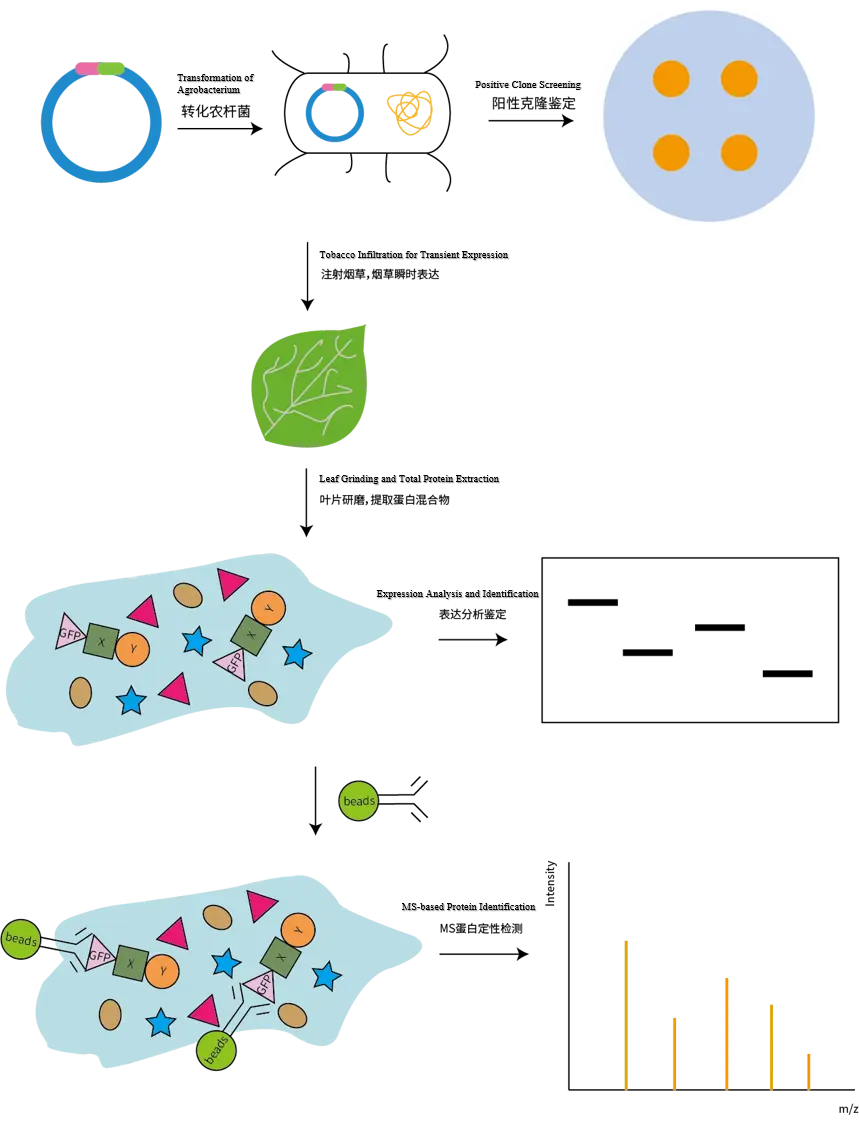
Service Timeline & Deliverables
Service Step | Working Days | Deliverables |
|---|---|---|
Gene Synthesis/Vector Construction | 10 | 1. Raw data, result images; 2. Standard experimental report (including experimental procedure); 3. Plasmids with target genes and sequencing reports |
Agrobacterium Transformation | 7 | |
Tobacco Transient Expression | 5 | |
LC-MS Mass Spectrometry Analysis | 15 |
Frequently Asked Questions (FAQ)
Q: How can we validate the interacting proteins identified by IP-MS?
A: Validation methods such as Co-IP, pull-down assays, or in-vivo methods can be used for further confirmation. Additionally, digital protein interaction site analysis provides detailed insights into specific interaction sites on the protein.
Q: What makes IP-MS superior to other protein interaction methods?
A: IP-MS is unique in that it can discover both known and novel protein interactions. It provides in-vivo results, offering data that is closer to the physiological conditions of the cell. This gives researchers a more accurate representation of protein behavior in the context of living systems.
Why Choose ProNet Biotech for IP-MS?
At ProNet Biotech, we specialize in high-quality Immunoprecipitation Mass Spectrometry (IP-MS) services for protein-protein interaction studies. Our advanced facilities and expertise in mass spectrometry ensure that you receive accurate, reliable, and reproducible results. Whether you are exploring new protein interactions or validating existing findings, our IP-MS service provides the tools you need for cutting-edge biological research.
Get in Touch
For more information on our IP-MS services or to request a quote, please contact us today. Our team is ready to help you advance your research with the latest in protein interaction technology.
References
1. Mazloom AR, Dannenfelser R, Clark NR, et al. Recovering protein-protein and domain-domain interactions from aggregation of IP-MS proteomics of coregulator complexes. PLoS Comput Biol. 2011 Dec;7(12):e1002319. doi: 10.1371/journal.pcbi.1002319.
2. Nhieu J, Wei CW, Ludwig M, et al. CRABP1-complexes in exosome secretion. Cell Commun Signal. 2024 Jul 29;22(1):381. doi: 10.1186/s12964-024-01749-w.
Statement: Services sold by our company are intended for research purposes only and must not be used for diagnostic or therapeutic purposes.
Services Workflow

Online Consultation
01

Solution Matching
02

Service Contract
03

One-Stop-Services
04

Project Report
05
Related Products
Product Inquiry

Contact Us

Tel: +86 025-85205672

Email: info@pronetbio.com

Address: Building 3C, Nanjing Xianlin Zhigu,
Qixia District, Nanjing, Jiangsu, China, 210033

Need more info?
Let's connect!



